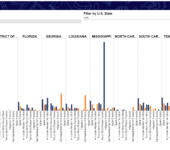 All students deserve safe and welcoming schools that do not use harmful discipline and school police to punish young people.
All students deserve safe and welcoming schools that do not use harmful discipline and school police to punish young people.
Schools must be able to invest in the people and programs that build strong school climates and foster the relationships that keep everyone safe.
Learn more about IDRA’s work to build safe and welcoming schools for all students below.
Sign up to receive our email updates!
Georgia schools use suspensions, corporal punishment, alternative school placements, expulsions and police officers to punish students. When schools rely on these harmful methods, they put students at a higher risk of repeating a grade, dropping out of school, and having contact with the juvenile and adult criminal justice and immigration systems – a process known as the “school-to-prison pipeline” or “school-to-deportation pipeline.”
In Georgia, Black students are significantly overrepresented in every category of discipline. According to CRDC data, Black students have the highest rates of discipline when compared to their peers. As the charts below illustrate, Black students’ rates of out-of-school suspension, expulsion, and school-related arrest rates are often two to three times higher than other groups.
Georgia is also one of the few states in the United States that allows teachers and administrators to paddle, spank, slap and hit students for disciplinary purposes, despite research showing the harms and ineffectiveness of this violent approach (Losen, et al., 2019).
See IDRA’s interactive data dashboard
Policy Recommendations for Georgia
To create safe and welcoming pathways for all students, Georgia education leaders should:
- Eliminate the state’s reliance on harmful exclusionary discipline practices and adopt evidence-based practices inside schools. Exclusionary discipline, such as suspension and expulsion, has significant negative harm to students’ academic, social and emotional outcomes (Craven, 2020; Lacoe & Steinberg, 2019). In Georgia, Black students are more than three times as likely to receive out of school suspension than their white peers (GOSA, 2023).
- Expand mandatory use of multi-tiered system of supports (MTSS) to include the entire prekindergarten-12 continuum to reduce the state’s reliance on exclusionary discipline. MTSS is currently required in pre-K through third grade before expulsion or long-term suspension (O.C.G.A. §20-2-742, 2022). Legislators should expand MTSS to include restorative practices, mediation and other evidence-based alternatives to exclusionary discipline and should ensure that students through the 12th grade can benefit from these experiences.
- Prohibit the use of corporal punishment on any child by repealing O.C.G.A §§ 20-2-730-732. Georgia is in the minority of states that still allow corporal punishment, a practice which has been shown to be harmful and disproportionately applied to students of color and students with disabilities (SPLC & CDRR, 2019; Craven & Sánchez, 2023).
- End the presence of police inside schools while also collecting and publishing comprehensive and disaggregated policing data, particularly use-of-force data, from schools that have a continued police presence. Studies show that school-based police are harmful for student environments and are associated with higher rates of arrests, suspensions and expulsions. These outcomes are disproportionately experienced by Black students (Homer, 2020; Fisher & Hennessy, 2016).
For more information, contact Terrence Wilson, J.D., IDRA Regional Policy and Community Engagement Director (terrence.wilson@idra.org).
Resources
Losen, D., Whitaker, A., Kizzire, J., Savitsky, Z., & Dunn, K. (2019). The Striking Outlier: The Persistent, Painful and Problematic Practice of Corporal Punishment in School. Southern Poverty Law Center & Center for Civil Rights Remedies.


